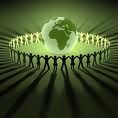What a great piece by Lisa Hymas on grist.com. When it comes to being childfree, she calls herself a GINK: green inclinations, no kids. May it replace the term that’s been out there for awhile–
DINK: double income no kids. About 10 years ago, DINK was coined to describe couples who do not have children by choice, who seemingly have lots of disposable income and buy lots of stuff.
I can tell you from talking to hundreds of childfree couples at that time and since then, just because a couple has decided not to have children does not mean they have lots of disposable income. In fact, one major consideration for not having children was because they felt they would not have the financial means.
Whatever the income level, in today’s world let’s face it we are all consumers to one degree or another. When it comes to parents and the childfree, maybe it comes down to that we just are buying different stuff…
But I digress. Hymas gets to a reason not to have kids that relates to all of us, including the kids that are already here. The premise: the “greenest” thing person can do in today society is to not have kids.
She writes she’s “thoroughly delighted by the fact that the most humane thing for me to do is to have no children at all. Making the green choice too often feels like a sacrifice or a hassle or an expense. In this case, ..it just so happens to cost a lot less for me and weigh a lot less on the carbon-bloated atmosphere.”
She writes a balanced piece, first making the point she bears “no ill will to procreators, past, present, and prospective.” Unlike a lot of pieces out there talking about the parenthood and childfree decisions, Hymas also does a nice run down of the the perks of parenthood and childfree life, as well as what each group misses out on by not making the other choice.
But to the heart of the matter is the “green good” that comes from bringing fewer beings onto a polluted and crowded planet. Given the climate change and sustainability issues our world faces, it’s time to consider the environmental benefits of the childfree life.
As Hymas writes, “we’re on track to hit a global population of 7 billion people next year or the year after—We’ve spewed enough greenhouse gases into the atmosphere to push it past the safe point, which many climate scientists agree is 350 parts carbon dioxide per million; we’re already at about 390 and rising fast. And Americans are among the most carbon-intensive people on earth.” Each year the average American generates about 20 tons of CO2. (consider the average Bangladeshi by contrast—.3 tons)
“According to a 2009 study in Global Environmental Change that took into account the long-term impact of Americans’ descendants, each child adds an estimated 9,441 metric tons of CO2 to a parent’s carbon legacy—that’s about 5.7 times his or her direct lifetime emissions.” Wow.
And a study at Oregon State University concluded that in the United States, “the carbon legacy and greenhouse gas impact of an extra child is almost 20 times more important than some of the other environmentally sensitive practices people might employ their entire lives – things like driving a high mileage car, recycling, or using energy-efficient appliances and light bulbs.”
Hymas makes the case for the simple truth that the single most meaningful contribution people can make to a cleaner, greener world is to not have children. It’s time to talk about this more seriously, for us, and for the children that are already here in our world.
Contrary to popular myth that the childfree are selfish, looked at in this way, on behalf of all who are on the planet right now including all the children who are already here, isn’t this the most selfless thing a person can do — To set aside what might be your personal desire for the greater good??

